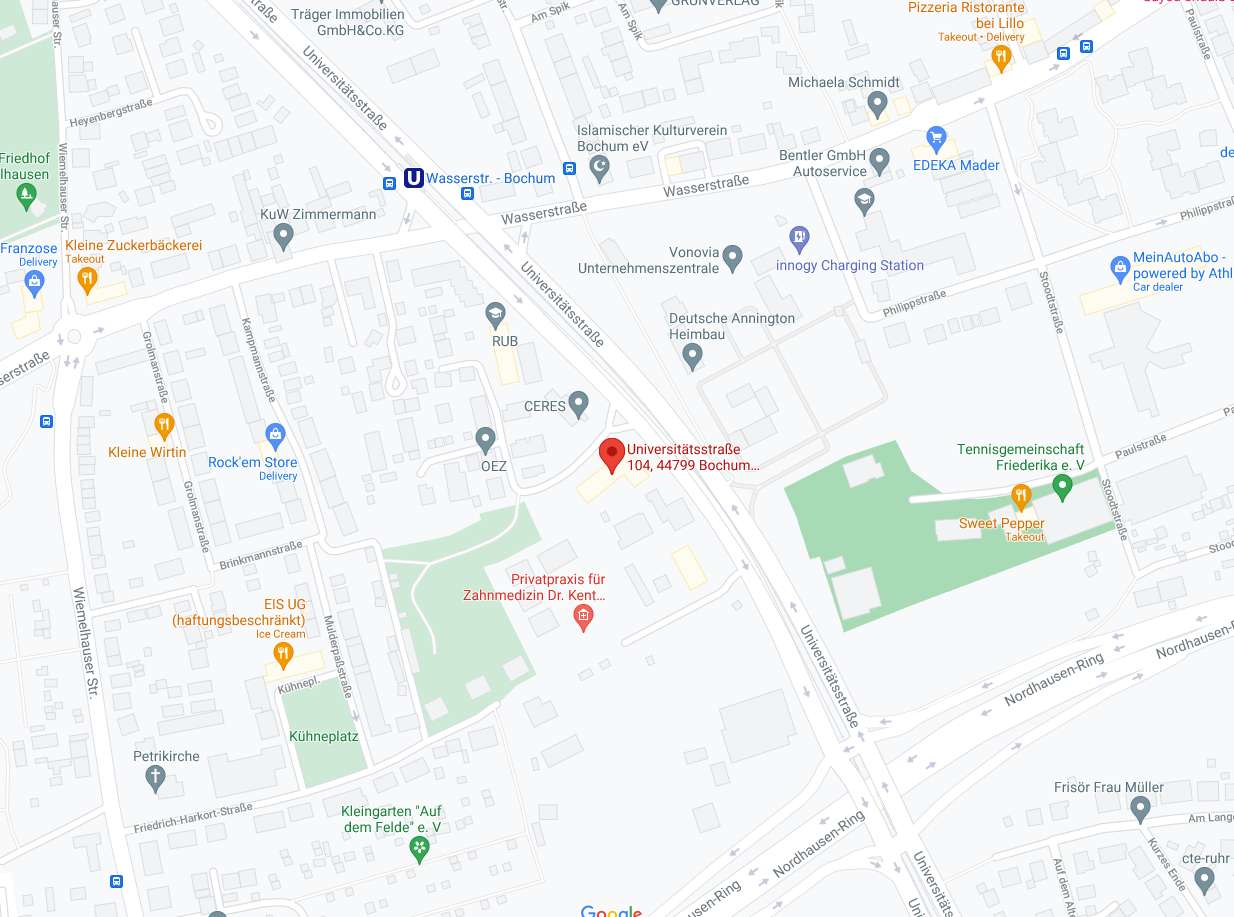Simple Present und Present Progressive
1. Simple present
1.1 Bildung
- Zur Bildung des simple present verwendet man den Infinitiv des Verbs.
| Infinitiv |
Beispielsätze:
- I like rock music.
- We go to school.
- You read a lot.
- In der 3. Person Singular wird an den Infinitiv ein –s angehängt.
|
Merksatz: He, she, it – das –s muss mit! |
Beispielsätze:
- Tom likes rock music.
- She reads a lot.
- Nach den Zischlauten –sh, -ss, -ch und –x wird in der 3. Person Singular ein –es angehängt.
Beispiele:
- She finishes her homework.
- He misses school.
- The cat catches a mouse.
- Mary mixes a drink.
- The dog crosses the street.
- Bei den Verben go und do wird in der 3. Person Singular ein –es angehängt.
Beispiele:
- Mary goes surfing every summer.
- Mr Miller does the cooking.
- Endet ein Verb auf einen Konsonanten + y, wird –y zu –ie, wenn ein -s angefügt wird.
- Wenn das Verb auf einen Vokal + y endet, bleibt das –y erhalten.
Beispiele:
|
We carry a heavy box. |
Tom carries a heavy box. |
1.2 Umschreibung mit do in Verneinungen und Fragen
- In Verneinungen werden die Vollverben mit do umschrieben.
- In Verneinungen werden die Vollverben in der 3. Person Singular mit does umschrieben. Das Vollverb benötigt in diesem Fall kein –s
Beispiele:
- We do not carry a heavy box.
- Susan does not try her best.
- In Fragen werden die Vollverben mit do umschrieben.
- In Fragen werden die Vollverben in der 3. Person Singular mit does umschrieben. An das Vollverb wird dann kein –s mehr angehängt.
Beispielsätze:
- Do you carry a heavy box?
- Does Susan try her best?
1.3 Gebrauch
- Das simple present wird verwendet, wenn…
- man eine regelmäßige Handlung ausdrückt. (Eine Handlung, die nur manchmal oder nie stattfindet, ist auch regelmäßig.)
- man über zukünftige (planmäßige) Vorgänge spricht. Dazu zählen Fahrpläne, Arbeitsstunden, Stundenpläne usw.
- man ausdrücken möchte, dass Handlungen aufeinander folgen.
- bei allgemeingültigen Aussagen.
- ein Gliedsatz durch as soon as, before, if, until, when eingeleitet wird.
Beispielsätze:
- Martin usually walks home after work.
- The train leaves at five o’clock tomorrow morning.
- Mary is doing the housework. First she cleans the windows. Then she does the dishes.
- Warm air rises.
- I’ll wait here until you come.
- Signalwörter für das simple present sind:
|
always |
immer |
2. Present progressive
2.1 Bildung
- Zur Bildung des present progressive verwendet man eine Form von be und die ing-Form.
|
am/is/are + present participle |
- Wenn der Infinitiv mit einem stummen –e endet, fällt dieses –e weg.
Beispiele:
- arrive – arriving
- close – closing
- prepare – preparing
- shine - shining
- Nach einem kurzen, betonten Vokal wird ein einfacher Endkonsonant verdoppelt.
Beispiele:
- clap – clapping
- grab – grabbing
- put – putting
- cut – cutting
- swim – swimming
- run – running
- Ausnahme für das British English: travel – travelling!
- Endet ein Verb auf –ie endet das present participle auf –y.
- Bei Verben, die auf –y enden, ändert sich dagegen nichts.
Beispiele:
- die – dying
- lie – lying
- try - trying
- play – playing
2.2 Gebrauch
- Das present progressive wird verwendet, wenn…
- man ausdrücken möchte, dass gerade jetzt etwas, in diesem Moment, geschieht.
- man über vorübergehende Ausnahmen spricht.
- man von einer fest geplanten Handlung in der Zukunft spricht.
Beispiele:
- Tom is writing a letter.
- I usually walk to school, but today I’m riding my bike.
- I’m playing tennis this Saturday.
- Signalwörter für das present progressive sind:
|
at present |
gegenwärtig, jetzt |
- Die progressive Form kann nur von Tätigkeitsverben gebildet werden, nicht aber von Zustandsverben.
- Zustandsverben sind zum Beispiel:
|
agree |
zustimmen |
3. Übungsaufgaben
3.1 Fill in the following verbs using simple present:
go, take, watch, see, buy, fall, go, put, look, watch
Tina must go to the supermarket today. She … the list from the table in the kitchen and … at it. There are only three things on it, but Popstars is on TV – she always … that. She … to the shop and … a packet of biscuits and a bottle of orange juice. After that she … Laura. They … back home together. Tina is happy because now she can watch Popstars. She … the bag on the table but the bag … to the kitchen floor. The orange juice and the biscuits are all over the floor. Poor Tina – now she can’t … TV because she must tidy up the kitchen.
3.2. Fill in the missing verbs in simple present
Tina … (aufstehen) early every morning. She … (gehen) into Mr and Mrs Wilson’s room. At 7 o’clock Mrs Wilson … (Frühstück machen) for the family. Tina … (helfen) her. She … (stellen) the cornflakes on the table. At 7.30 Tina … (sich fertig machen) for school. At 7.45 Tina .. (zur Schule gehen) with her mother. School … (zu Ende sein) at 12:45. Mr Wilson … (kommen) and … (abholen) Tina from school.
3.3 Finish the dialogues using present progressive
a) Can I play with Mark and John? - No, sorry, … (they – do – their homework)
b) Is Mrs Wilson at home ? - No, sorry … (she- go for a walk – in the park)
c) Hey, let us watch “Popstars” on TV! - No, sorry … (we – play – cards)
d) Julia, let us play a game. - No, sorry … (I – make – salad)
3.4 Simple present or present progressive?
a) I … (to wish) I had some money.
b) Tom (to grow) a beard at the moment.
c) I (play) soccer this weekend.
d) Rarely … he … (to do) the dishes.
e) Usually she … (to take) the train to work but today she (to take) her bicycle.
f) As a rule Dad … (to prepare) curry on Tuesdays.
4. Lösungen
3.1
takes; looks; watches; goes; buys; sees; go; puts; falls; watch
3.2
gets up; goes; makes breakfast; helps; puts; gets ready; walks to school; finishes; comes; collects
3.3
a) … they are doing their homework.
b) … she is going for a walk in the park.
c) … we are playing cards.
d) … I’m making a salad.
3.4
a) I wish I had some money.
b) Tom is growing a beard at the moment.
c) I’m playing soccer this weekend.
d) Rarely does he do the dishes.
e) Usually she takes the train to work but today she is taking her bicycle.
f) As a rule Dad prepares curry on Tuesdays.
Fragen & Antworten
Ja, bei tutoria bieten wir die Möglichkeit eines Probeunterrichts an, um sicherzustellen, dass unsere Nachhilfeleistungen den individuellen Bedürfnissen Ihres Kindes entsprechen. Der Probeunterricht ermöglicht es uns, den Lernbedarf Ihres Kindes besser zu verstehen und einen passenden Nachhilfelehrer auszuwählen. In diesem ersten Treffen kann Ihr Kind den Nachhilfelehrer kennenlernen, Fragen stellen und erste Lernerfolge erzielen.
Unsere Nachhilfestunden dauern in der Regel 2x 45 Minuten. Diese Zeitspanne ermöglicht eine effiziente und konzentrierte Lernsituation, die es unseren qualifizierten Nachhilfelehrern ermöglicht, den Lehrstoff optimal zu vermitteln und individuelle Fragen zu beantworten.
Wir verstehen, wie wichtig eine vertraute Umgebung für den Lernprozess ist, daher findet bei tutoria die Nachhilfe immer bei Ihnen zu Hause statt. Unsere qualifizierten Nachhilfelehrer kommen direkt zu Ihnen nach Hause, um eine Lernumgebung zu schaffen, in der Ihr Kind sich wohl fühlt und sich gut konzentrieren kann.
Die Kosten für eine Nachhilfestunde bei tutoria variieren je nach der gewünschten Dauer und Laufzeit der Nachhilfe. Der Preis für eine 45 Minuten Einheit beginnt ab 19,90€. Wir sind stolz darauf, eine faire Preisgestaltung anzubieten, die es unseren Schülern und ihren Familien ermöglicht, die für sie passende Nachhilfeleistung zu finden.
Bei tutoria sind unsere Nachhilfelehrer sorgfältig ausgewählt und verfügen über umfassende Qualifikationen, um sicherzustellen, dass Ihr Kind die bestmögliche Unterstützung erhält. Unsere Nachhilfelehrer sind erfahren darin, den Lehrstoff effektiv zu vermitteln und auf die individuellen Bedürfnisse der Schüler einzugehen. Außerdem sind sie Experten in ihren Fachgebieten und haben nachweislich umfassende Kenntnisse in den relevanten Schulfächern. Sie sind in der Lage, den Lehrstoff verständlich zu erklären und Lernstrategien zu vermitteln, die zu nachhaltigem Erfolg führen.



























